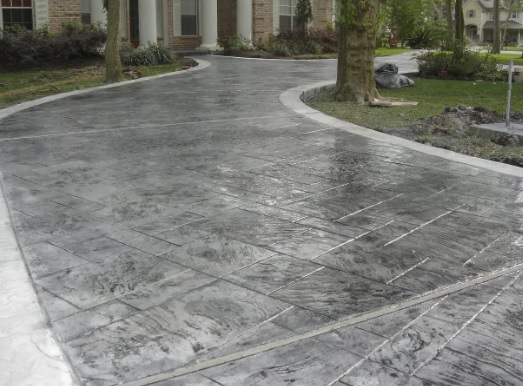There are a few different types of concrete sealers that can be used to seal a concrete driveway. The best sealer for concrete driveways will depend on the condition of the concrete driveway, your reason for sealing the concrete driveway, and what you want the concrete driveway to look like once sealed.
The three most common types of sealers for concrete driveways are silicate concrete sealers, water repellent concrete sealers, and acrylic concrete sealers.
| Silicate Concrete Sealers | Water Repellent Concrete Sealers | Acrylic Concrete Sealers |
| Won’t change the look of the concrete | Won’t change the look of the concrete | Enhances with a wet look or gloss |
| Works entirely below the surface | Works entirely below the surface | Leaves a visible surface film |
| Lasts forever | Lasts 7-10 years | Lasts 1-5 years |
| Increase strength of concrete | Repels surface water | Protects surface against staining |
| Reduces dusting and spalling | Reduces staining and deterioration | Stops dusting, staining, deterioration |
| Can only be used on cured concrete | Can be used on cured and uncured concrete | Can be used on cured and uncured concrete |
If you are experiencing issues with damage and deterioration caused by week concrete, or have issues with concrete dusting, you want to use a densifier to increase the strength and density of the concrete. Densifiers will not cause water and other liquids to bead off the surface so if you want an increase in strength and water repellency, you will need to use a densifier first and then a water repellent sealer a week later.
If you are experiencing issues with damage and deterioration caused by water absorption, snow and ice, or mold and mildew then you want to use a water repellent sealer. Water repellent concrete sealers cause water and other liquids to bead off the surface, and will reduce damage and deterioration caused by water absorption. The two most common types of water repellent sealers are siliconate water repellent sealers and silane-siloxane water repellent sealers. Siliconate water repellent sealers should only be used on light or white concrete because when applied to dark concrete, can leave behind a white surface residue. Silane-Siloxane water repellent sealers can be applied to all types and colors of unsealed concrete.
If you don’t like the look of bare concrete, and want a wet look, low gloss, or high gloss finish, then you want an acrylic concrete sealer. Acrylic concrete sealers will enhance concrete, and provide complete protection against staining and deterioration caused by water absorption and surface abrasion.
Sealers reduce damage and deterioration, and coatings (acrylic sealers) stop damage and deterioration. If you are looking for a preventative sealer that won’t change the look or color of the concrete driveway, a silicate or water repellent driveway sealer is best. If you are looking for complete protection, or want to enhance the look of the concrete driveway, then you want an acrylic sealer.
Resealing a Concrete Driveway
If your concrete driveway has already been sealed, then you want to make sure that the new concrete sealer is compatible with the sealer currently down. It is always best to check with the manufacturer, and apply the new sealer to a test area to verify compatibility.
Silicate Sealer: Concrete driveways previously sealed with a silicate sealer can be resealed with a water repellent sealer or an acrylic sealer.
Water Repellent Sealer: Water repellent sealers can be resealed with a solvent based water repellent sealer or a solvent based acrylic sealer.
Acrylic Sealer: Driveways previously sealed with a water based acrylic sealer need to be recoated with a water based acrylic sealer, and driveways previously sealed with a solvent based acrylic sealer need to be recoated with a solvent based acrylic sealer.

